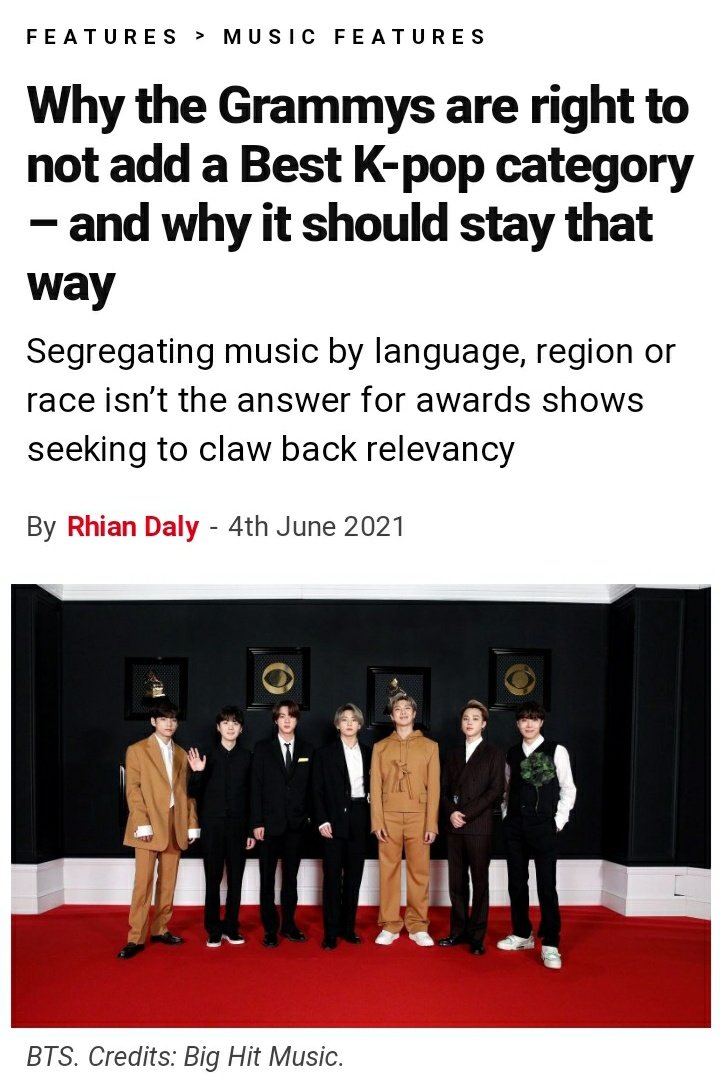In recent years, when the time has rolled around for another raft of Grammy nominations to be announced, one question has popped up: When will a Best K-pop category be added to the shortlists?
Earlier this month, those asking – more often than not, journalists rather than actual K-pop fans – got their answer: not any time soon. “What we’ve heard from the community is that they consider what they are creating to be pop music,” the Recording Academy’s chief awards officer Bill Freimuth told Billboard. “Some argue that it’s pop music from Korea.”
We’ll overlook the implication through the use of “argue” that there might be a logical claim that K-pop – Korean popular music – isn’t “pop music from Korea” for now. It’s rare to see the Grammys get something right, but it could be onto something here. Pop music is pop music, regardless of geographical location, the racial or ethnic identity of those making it, the language it’s sung in, or any other factor you might choose to segregate people by.
The Billboard piece went on to reveal that only 14 submissions to the Grammys were received from the K-pop industry for the 2021 awards – a number far short of the 100 needed for a new field to be considered. But whether there continues to be 14 submissions or 140, the Academy should stick to the decision it has made so far and never add a Best K-pop category.
Doing so might give a handful of Korean groups new bragging rights and a shiny new trophy to display, but how much would it do for them in the wider world? If you’re not already interested in a particular genre or scene, the likelihood of you paying that much attention to a niche category celebrating its artists is low, so the chances of such a field bringing heaps of recognition onto K-pop stars also seems slim.
Segregating awards shows by language or region, as already happens with the Grammys’ Latin and “global music” categories, continues to perpetuate the othering of music that isn’t Western, white (until very recently Black artists also struggled to be considered in the main categories) and English-led. It takes the onus off of awards bodies to work towards equal diversity and representation, or judging music on its merit and with an open mind, because those releases can just sit in the specific categories created to celebrate them at arm’s length.
You only have to look at the Latin categories for proof of this. For example, the Best Latin Pop category was introduced back in 1984, yet very few Latin artists have been nominated in the ‘Big Four’ fields – Record Of The Year, Album Of The Year, Song Of The Year and Best New Artist – since then. There was Los Lobos in 1987 and Los Lonely Boys in 2005. Since then, J Balvin and Bad Bunny have been up for Record Of The Year, but only as part of Cardi B’s ‘I Like It’, while Luis Fonsi’s smash ‘Despacito’ won the record and song awards. In 37 years, that’s pathetic.
As music fans’ listening habits become increasingly open and globally-focused, it will become ever clearer that the Grammys – and other institutions like it – are painfully behind the times. Partitioning artists into more divisions won’t do anything to help that. If The Recording Academy wants to claw back relevancy, it should continue to diversify itself and seek to strategise ways to become more inclusive. And no, this doesn’t include booking BTS and then putting them on last to keep your viewership ratings up.
A Best K-pop category would also raise questions about the representation of Korean music as a whole. After all, the country is filled with as many diverse genres as the US or UK – why shouldn’t they be celebrated too? Or do new fields only get to be added once artists from a particular scene have achieved a certain level of recognition in the west? If so, that points once again to a need for the Western music industries to consider dismantling the perception that the music they put out is the standard to beat and their parameters for success are what everything should be measured against.
“Music transcends language” is a phrase that is often uttered by K-pop idols in their interviews, not because it’s a cliche, but because it’s true. That’s a sentiment that Grammys – and all awards shows – should keep in mind when the inevitable question about whether to add a Best K-pop field comes up again. Stop looking for the differences in music and appreciate it for the quality and talent poured into it instead. Maybe then, with open minds and inclusive shortlists, these ceremonies will start to matter again.
